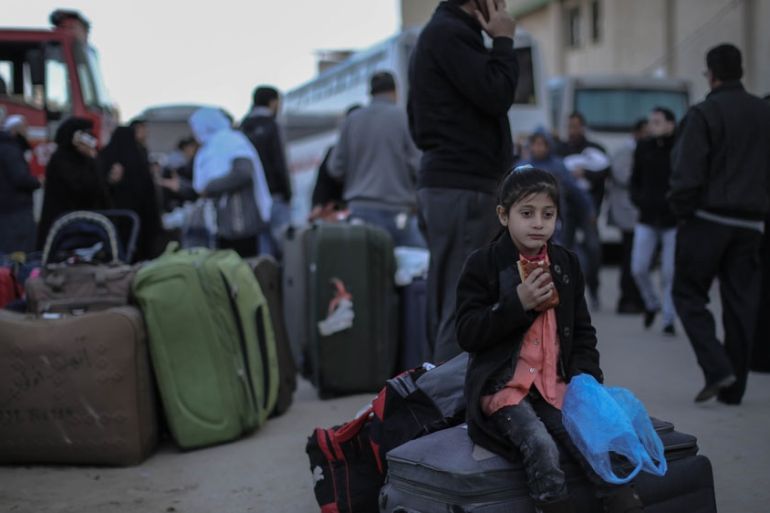Palestinians in Gaza mass for rare Rafah border opening
Hundreds with urgent needs cross into Egypt from besieged Gaza Strip, as border opens for first time in two months.

Hundreds of people have assembled in the southern Gaza Strip, hoping to pass through the Rafah crossing into Egypt during a rare two-day opening of the border to Palestinians in the besieged coastal enclave.
With the crossing open for the first time since early December, only 765 Palestinians were approved to pass into Egypt on Saturday, according to Palestinian authorities.
Keep reading
list of 4 itemsAs Israel attacked Gaza’s north, 26 members of his family were wiped out
What is Trident, the US floating pier off Gaza? Will it work?
Does Israel’s Netanyahu have a plan for a ‘day after’ the war on Gaza?
More than 25,000 people have registered to cross Rafah because of urgent needs, including some 3,500 who need to travel for medical purposes, according to a Ma’an News Agency report.
Gaza has endured a tight blockade, enforced by both Israel and Egypt, since the Hamas political organisation took control of the region in 2007.
|
|
| UpFront – Reality Check: Gaza is still occupied |
Egyptian authorities open the border only for brief periods every few months, according to Gisha Legal Centre for Freedom of Movement, an Israeli rights group.
On Saturday, hundreds of Palestinians waited in the nearby Abu Yousef an-Najjar Sports Centre, as buses came to transport people to the crossing.
Ali Hamed, 23, waited for hours at the crossing before being allowed to pass.
“I have already been accepted to study at a university in Turkey,” he told Al Jazeera. “I even have a visa, but I have been waiting for a year and a half, spending all my money trying to get out [of Gaza].”
There was chaos in the sports centre as people waited in long queues for their turn to be transported to the border. As the day stretched on, some grew tired, sleeping on the floor of the basketball court, while children cried.
Speaking to a press conference in Gaza, Ismail Haniyeh, a senior political leader in Hamas, thanked the Egyptian government for opening the border. “There are thousands of people on the waiting list. We all hope the crossing will be opened permanently.”
![Hundreds waited inside the Abu Yousef an-Najjar Sports Centre for their turn to move on to the Rafah crossing [Ezz Zanoun/Al Jazeera]](/wp-content/uploads/2016/02/0e4115410b764304ae42cb08a1ba6aaf_18.jpeg)
Humanitarian catastrophe
Since late 2008, Israel has carried out three major military offensives against Palestinians in Gaza, leaving the region in ruins.
In July and August 2014, Israeli forces attacked Gaza from land, air and sea for 51 days, while Palestinian armed groups carried out cross-border raids and fired rockets into southern Israel.
Of more than 2,200 Palestinians killed during that war, an estimated two-thirds were civilians, according to the United Nations Office for the Co-ordination of Humanitarian Affairs. More than 100,000 housing units were damaged or destroyed.
READ MORE: ‘All options are open’ – will Gaza join the uprising?
Seventy-one Israelis, including 66 soldiers and six civilians, were killed during the fighting.
Since Israel’s 2014 offensive concluded, an estimated 1.9 million Palestinians in Gaza have struggled with a devastated economy.
Unemployment hovers around 41 percent, while more than 70 percent of the population is dependent on humanitarian aid, according to Gisha.
Egypt has severely restricted entry through Rafah since June 2013, when Abdel Fattah el-Sisi became president following the ousting of his predecessor, Mohamed Morsi.
“From January [to] September 2015, Rafah crossing was open on 27 days only, with transit out of Gaza to Egypt barred on four of these,” Gisha noted.
![One man, who did not provide his name, told Al Jazeera he had been trying to travel for the past 18 months [Ezz Zanoun/Al Jazeera]](/wp-content/uploads/2016/02/26a133138ead4e17ab4928bfd9a93186_18.jpeg)
Although Gaza’s Ministry of Health recorded more than 10,600 injuries during that war, travel restrictions have prevented most from leaving the country to seek treatment or entering Israel through the Erez crossing in the strip’s north.
Ramy Abdu, director of the Gaza chapter of the Euro-Mediterranean Human Rights Monitor, said that more than 80 percent of Palestinians were formally banned or barred from travelling through the Israeli-controlled Erez crossing.
“Those who do pass often face humiliation or blackmail,” he told Al Jazeera, referring to Israel’s efforts to recruit informants in exchange for crossing Erez.
“So for most Palestinians in Gaza, the only path to the outside world is Rafah,” Abdu said.
Back at the Abu Yousef an-Najjar Sports Centre near Rafah, Abu Saoud, who did not provide his last name, said he had been considering leaving the country since 2011, when he returned to Gaza after spending 26 years in Israeli prison.
“I made the final decision to take my family and leave Gaza when the last war ended [in August 2014],” he told Al Jazeera. “But the border is almost always closed to us.”
With reporting by Ezz Zanoun from the Gaza Strip: @Ezzpress
Follow Patrick Strickland on Twitter: @P_Strickland_
![Rafah is the only way for many Palestinians to travel, as Israel restricts movement through the Erez crossing in northern Gaza [Ezz Zanoun/Al Jazeera]](/wp-content/uploads/2016/02/c9a51291e670463aa8feab78b33c3184_18.jpeg)